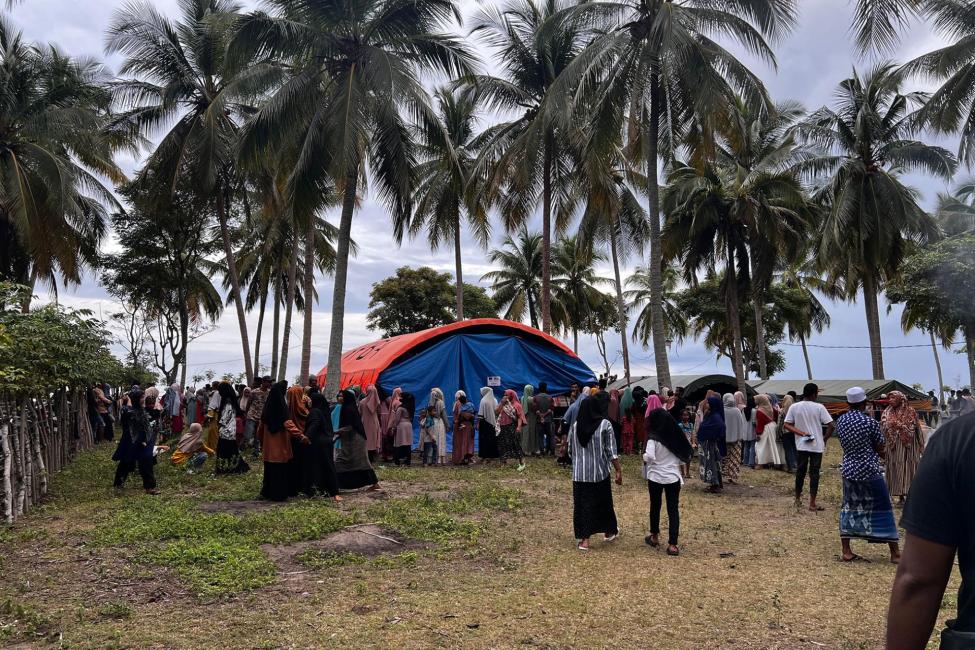-
Who we are
WHO WE AREThe International Organization for Migration (IOM) is part of the United Nations System as the leading inter-governmental organization promoting since 1951 humane and orderly migration for the benefit of all, with 175 member states and a presence in over 100 countries. IOM joined the United Nations system in September 2016.
About
About
IOM Global
IOM Global
-
Our Work
Our WorkAs the leading inter-governmental organization promoting humane and orderly migration, IOM plays a key role to support the achievement of the 2030 Agenda through different areas of intervention that connect both humanitarian assistance and sustainable development.
Cross-cutting (Global)
Cross-cutting (Global)
- Data and Resources
- Take Action
- 2030 Agenda
Unprecedented Migrant Surge in Central America and Mexico; IOM Calls for Regional Action
Geneva/San José – The International Organization for Migration (IOM) is appealing for governments in Central America and Mexico to collaborate to address the immediate humanitarian needs of people on the move as unprecedented numbers of vulnerable migrants transit through the region, while also working on long-term solutions to tackle the drivers of migration.
"The situation underscores the urgent need for the immediate collective involvement of governments from origin, transit and destination countries to provide humanitarian assistance, especially to vulnerable groups like women and children," said Michele Klein Solomon, IOM Regional Director for Central America, North America and the Caribbean.
Panama’s National Migration Service has reported a record number of migrants crossing the perilous Darien jungle from Colombia this year. As of 23 September, over 390,000 individuals have braved the treacherous route; 82,000 migrants crossed in August alone, the highest monthly figure ever recorded. Most of the migrants come from Venezuela, Ecuador and Haiti.
Beyond the sheer increase in the numbers of people making the trip, the most significant trend has been the shift by Cuban migrants and those coming from African nations who are increasingly choosing air routes to reach Central America, sidestepping the Darien to continue their northbound trip. Only 4,100 migrants from Africa crossed the Darien between January and July 2023, a 65 per cent decrease from the same period in 2022; Honduras by contrast saw a staggering 553 per cent increase in arrivals from African nations to 19,412 people through its southern border. Similarly, only 524 Cubans were reported in the Darien during this period, in contrast to the 17,157 recorded arriving by land in Honduras.
People transiting Central America and Mexico face numerous challenges. The trek through the Darien jungle leaves many injured, sometimes abandoned on muddy slopes, swept away by sudden river floodings, and vulnerable to robbery, violence and sexual abuse.
In countries along the route, financially depleted families find themselves hungry, sleeping in the streets and forced to beg. Many experience health issues like diarrhea and dehydration.
Throughout Colombia, Central America and Mexico, IOM monitors movements and supplies life-saving information and assistance. IOM provides hygiene items, food, protection services and health care. The Organization also assists with voluntary return operations, infrastructure and shelter support, and carries out communication campaigns to counter false information and alert migrants about the dangers associated with irregular migration.
Despite the efforts of transit nations, UN agencies and humanitarian organizations, the capacity to offer life-saving aid is stretched thin.
Migration drivers are complex, ranging from economic and social factors to environmental and political challenges. Many of these triggers have been intensified by the socioeconomic repercussions of the COVID-19 pandemic, recent extreme weather events, and political unrest in countries of origin. The anticipated El Niño climate phenomenon threatens to further exacerbate conditions, potentially spurring more people to make the decision to move.
"The challenges of migration are too vast for any nation in the Americas to tackle alone," said Marcelo Pisani, IOM’s Regional Director for South America.
"As mandated on the Global Compact on Migration, IOM advocates for a comprehensive, collaborative regional strategy and reaffirms its unwavering support for initiatives that uphold international humanitarian duties, sustainable development objectives, and the fundamental human rights of those on the move."
***
For more information please contact:
In San José:
Jorge Gallo, +506 7203 6536, jgallo@iom.int
In Geneva:
Diego Pérez Damasco, +41 79 582 7235, diperez@iom.int

